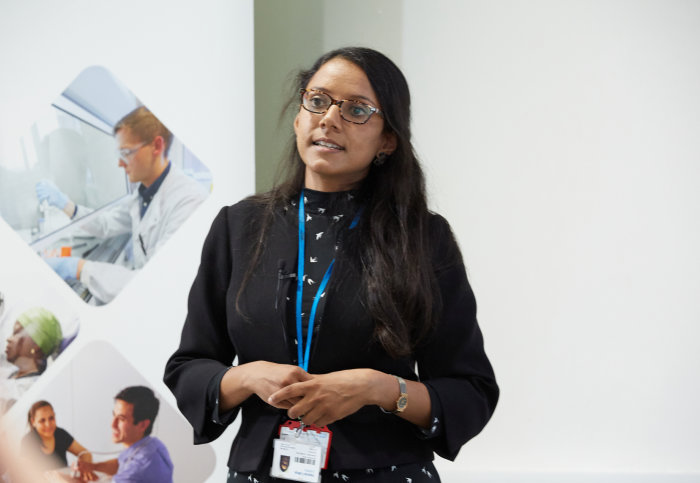Experts explain how personalised diabetes treatments can help patients
by Maxine Myers

Improving diagnosis and further understanding the role of genes in diabetes risk can pave the way for more personalised treatments, say researchers.
Dr Ines Cebola, postdoctoral researcher at Imperial College London, and Dr Shivani Misra, consultant in metabolic medicine at Imperial College Healthcare NHS Trust, presented their research on type 2 and rare diabetes, as well as personalised treatments at the recent Imperial College Academic Health Science Centre (AHSC) seminar series.
In a packed lecture theatre at St Mary’s Hospital, Dr Cebola explained how variations in non-coding sections of the genome might contribute to type 2-diabetes risk in the video above.
Type 2 diabetes is a common condition that causes the level of glucose in the blood to become too high. It can cause symptoms like excessive thirst and tiredness. It can also increase the risk of developing more serious conditions connected to the heart, eyes and nerves. It affects over 400 million people worldwide and genetic factors have long been known to have an important role in determining a person’s risk of type 2 diabetes, alongside other factors such as body weight, diet and age.
Dr Cebola explained how scientists at the College have mapped the regions in the genome that orchestrate gene activity in the cells of the pancreas that produce insulin, a hormone that regulates blood sugar.
In type 2 diabetes, the tissues become less responsive to insulin, resulting in blood sugar levels being too high. Most people can compensate when this happens by producing more insulin, but in people with type 2 diabetes, the pancreas cannot cope with this increased demand.
The team also identified genome sequences that drive gene activity in insulin-producing cells specifically. They found that these sequences are located in clusters, and that genetic variants known to be linked to diabetes risk are also found in these clusters.
Dr Cebola explained that these findings could lead to more personalised medicine as they may help stratifying the population according to their genetic risk of dysfunction of the insulin-producing cells specifically. This stratification of patients at higher risk of developing type 2 diabetes by dysfunction of the insulin-producing cells will allow clinicians in the future to administer more targeted treatments.
Dr Shivani Misra presented her findings in the video above on the MY DIABETES study. The study characterises young-onset diabetes in UK ethnic groups. The study seeks to find out how type 1 and type 2 diabetes vary in different ethnics groups, and whether maturity onset diabetes of the young (MODY) is found in all ethnic groups.
MODY is a rare form of diabetes which runs in families and is caused by a mutation in a single gene. MODY is very rare compared with Type 1 and Type 2 diabetes and around 20-40,000 people in the UK have it. Unlike type 1 diabetes, people with MODY may not need to take insulin for their condition.
As MODY is so rare, doctors may not be aware of it, so it’s estimated that about 80 per cent are mistakenly diagnosed with Type 1 or Type 2 diabetes at first.
In the preliminary analysis of the first 1300 participants, Dr Misra outlined that health care professionals are missing cases of MODY in south Asian and African Caribbean individuals compared with White Europeans. As a result these individuals may not be getting the right treatment.
Dr Misra also found that using broader criteria such as whether a person is making their own insulin identified undiagnosed cases of MODY in non-white ethnic groups. Dr Misra suggested that using these new guidelines could help doctors to better diagnose MODY and refer more patients for genetic testing.
Dr Misra aims to use the findings of her study to stratify patients with young-onset diabetes to improve diagnosis and to deliver precision diabetes care.
The seminar was the first of a new series at St Mary’s Hospital designed to showcase the work of the AHSC, a partnership between Imperial College London and three NHS Trusts. It aims to translate world-leading discovery science into new diagnostics, devices and therapies as quickly as possible, for the benefit of patients and populations worldwide.
The next event will be on ‘New insights into tackling and treating cardiovascular disease’ and will take place at Hammersmith Hospital from 12:00.
This talk will be delivered by Professor Peter Weinberg, from the Department of Bioengineering at the College, and Dr Rasha Al-Lamee, Interventional Cardiology Consultant at the Trust.
Article text (excluding photos or graphics) © Imperial College London.
Photos and graphics subject to third party copyright used with permission or © Imperial College London.
Reporter
Maxine Myers
Communications Division
